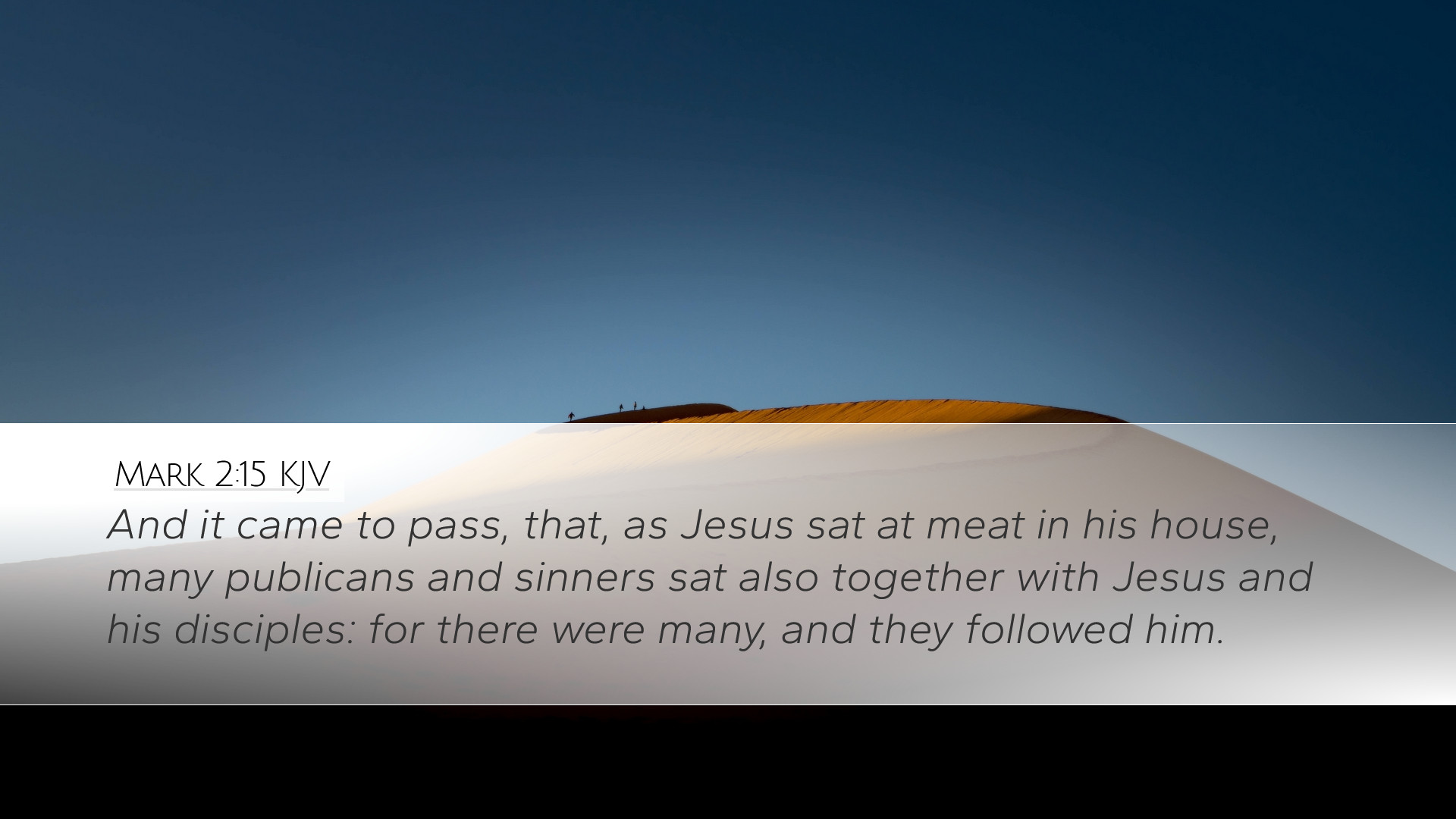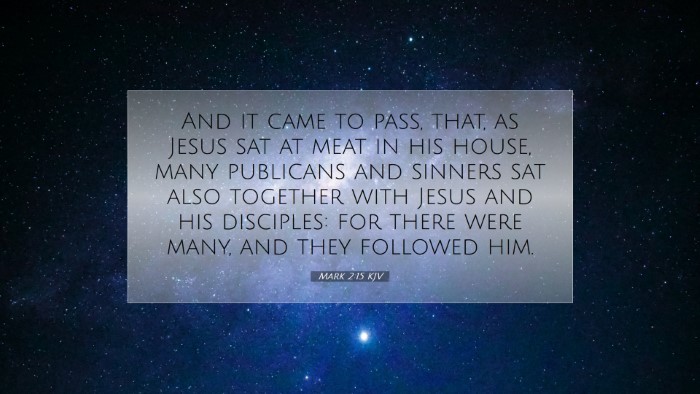Old Testament
Genesis Exodus Leviticus Numbers Deuteronomy Joshua Judges Ruth 1 Samuel 2 Samuel 1 Kings 2 Kings 1 Chronicles 2 Chronicles Ezra Nehemiah Esther Job Psalms Proverbs Ecclesiastes Song of Solomon Isaiah Jeremiah Lamentations Ezekiel Daniel Hosea Joel Amos Obadiah Jonah Micah Nahum Habakkuk Zephaniah Haggai Zechariah MalachiMark 2:15
Mark 2:15 KJV
And it came to pass, that, as Jesus sat at meat in his house, many publicans and sinners sat also together with Jesus and his disciples: for there were many, and they followed him.
Mark 2:15 Bible Commentary
Bible Commentary on Mark 2:15
Verse: "And it came to pass, that, as Jesus sat at meat in his house, many publicans and sinners sat also together with Jesus and his disciples: for there were many, and they followed him."
Contextual Background
In this passage, we find Jesus at a banquet, which serves as a critical narrative moment within the Gospel of Mark. The social implications of His association with publicans (tax collectors) and sinners emphasize both the radical nature of His ministry and the inclusive reach of His message.
Matthew Henry describes the setting, noting that Jesus was not merely seeking the company of the righteous but was deliberately eating with those deemed socially rejected. This reflects the theme of Jesus' mission—to seek and save that which was lost (Luke 19:10).
Insights from Commentaries
- Matthew Henry: Highlights the significance of Jesus sitting at meat with publicans and sinners. Henry points out that such an act was scandalous to the Jewish leaders of the time, illustrating Jesus’ challenge to social norms and religious boundaries. By eating with these individuals, Jesus demonstrated that His message of grace was accessible to all, regardless of societal judgment.
- Albert Barnes: In his commentary, Barnes elaborates on the implications of Jesus’ fellowship with these marginalized groups. He notes that the term “publicans” refers to those who were often despised in society due to their collaboration with the Roman authorities. Barnes emphasizes that Jesus’ inclusivity offered a radical shift in understanding who could be a recipient of God’s grace, highlighting the transformative power of Jesus’ love.
- Adam Clarke: Clarke provides a close examination of the identity of the “sinners” mentioned in this verse. He argues that this term denotes individuals considered outcasts and morally unclean. Clarke points out that Jesus’ approach is pivotal, as it serves as a model for ministry; believers are called to engage with those society rejects, fostering an environment of acceptance and care.
Theological Implications
The association of Jesus with publicans and sinners has profound theological implications. This act reveals the heart of God, which is inclined towards mercy rather than judgment (Matthew 9:13). It challenges the self-righteous attitudes often present in religious circles. Henry notes that this instance confronts legalism—Jesus emphasizes that He came not to call the righteous but sinners to repentance, embodying a ministry of grace rather than condemnation.
Furthermore, Clarke comments on the importance of community within this passage. By sharing a meal, Jesus was establishing relationship and fellowship. In the context of the early church, this reflects the inclusive nature of the Christian community, where all are welcomed to the table. This theme of welcome resonates with contemporary discussions on church community and outreach.
Practical Application
For pastors and theologians, Mark 2:15 is a compelling reminder of the church's mission to engage with the marginalized. It challenges the notion of exclusivity in ministry, urging a posture of openness and love towards those who may feel unworthy or unwanted in the eyes of religious society.
- Embrace Diversity: Leaders should strive to create spaces that reflect the diversity of the community, recognizing that every individual bears the image of God.
- Fellowship: This passage encourages believers to see fellowship as a means of grace. By sharing meals and cultivating relationships, the church can model the inclusivity of Christ.
- Evangelism: Just as Jesus reached out to those on the fringes, so too should believers employ relational evangelism—meeting conditions of fellow humanity to share the Good News.
Conclusion
Mark 2:15 serves as a powerful testament to the radical inclusivity of Jesus' ministry. Drawing from the insights of Matthew Henry, Albert Barnes, and Adam Clarke, we see that Jesus’ engagement with publicans and sinners is a call to embrace those whom society often rejects. For pastors, students, theologians, and scholars, this passage offers not only historical and theological richness but also a challenging mandate for contemporary ministry.


